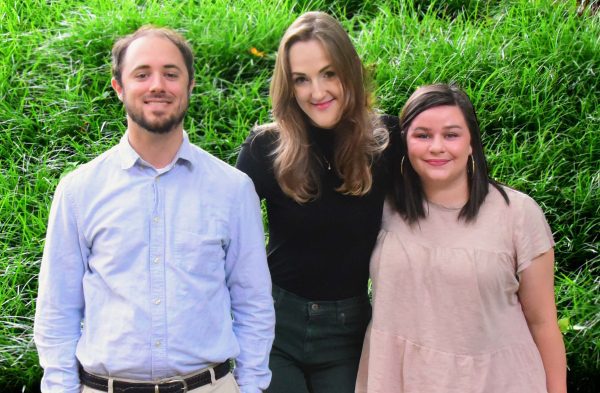Thomas D. Walsh Graduate Research Fellowship Finalists For 2021 Announced

The Thomas D. Walsh Graduate Research Fellowship, made possible by the generous support of Dr. Thomas D. Walsh recognizes outstanding contributions by M.S. candidates to graduate research. Returning graduate students are eligible for this prestigious award after their first year. The Thomas D. Walsh Graduate Research Fellowship supports the winner with a research assistantship and tuition support through their second year.
The finalists selections are in! Congratulations to Ashley Blackwell, Kimber Focke, and Steve Schmal for their selection as finalists for the Graduate Research Fellowship competition this year! The competition will be conducted on July 23rd and the recipient will be announced soon thereafter. Congratulations again!
Steve Schmal, originally from Boone, North Carolina, received his B.S. in Chemistry from Appalachian State University in spring 2016. He began his career as a secondary education teacher at South Iredell High School, where he taught Chemistry at the Academic, Honors, and Advanced Placement levels. He also taught chemistry in the format of the International Baccalaureate Programme, where he taught students in the Middle Years Programme and the Diploma Programme. Steve began pursuing the M.S. in Chemistry degree at UNC Charlotte in the fall of 2020, where he joined Dr. Poler’s lab with an interest in water purification materials. Steve plans to pursue a career in water purification and sustainability in the Charlotte area.
Research Overview: Steve’s research primarily focuses on the synthesis and characterization of new nanoscale materials that are capable of removing toxic, persistent, pervasive molecules from water. These molecules, among which are disinfection byproduct precursors, pharmaceuticals, personal care products, heavy metals, and per- and polyfluorinated substances, are all currently being targeted by the USEPA. Steve has used Isothermal Titration Calorimetry to characterize the binding characteristics of polymer-based water purification methods. Dr. Poler’s group has developed a green, all aqueous synthesis of (p-Vinylbenzyl)trimethylammonium chloride using the Activators Regenerated by Electron Transfer Atom Transfer Radical Polymerization synthetic method. Steve’s goal is to use this method to synthesize cellulose-based nanoscale ion exchange resins and characterize the strength of the binding interaction during complex formation with the above target molecules.
Kimber Focke, born and raised in Charlotte, NC, earned her B.S. in Chemistry with a concentration in Biochemistry from UNC Charlotte in spring 2020. During her time at UNC Charlotte, she conducted research in X-ray crystallography under the direction of Dr. Daniel S. Jones and participated in the NanoSURE REU program. She also performed quality assurance testing on cannabidiol (CBD) consumer products during an internship with G2 Analytical. After developing a strong interest in separations and mass spectrometry during her undergraduate career, she entered the master’s program in chemistry at UNC Charlotte in the fall of 2020 and joined Dr. Brian T. Cooper’s lab. She intends to pursue a Ph.D. in analytical chemistry and a research career in mass spectrometry.
Research Overview: Reversed-phase liquid chromatography (RP-LC) of proteins induces conformational changes due to the denaturing effects of both the hydrophobic stationary phase and the high-organic mobile phase. Kimber is investigating the effects of adsorption history and mobile phase composition on the conformation of bovine serum albumin (BSA) using mass spectrometric protein footprinting. This technique involves modifying solvent-accessible amino acids with chemical reagents, yielding a covalently labeled protein with an observable mass difference. The modified protein is reduced, alkylated, and digested into peptides, which are analyzed using LC-MS. Peptides are identified with tandem mass spectrometry (MS/MS) and modification sites are located through mass shifts in the tandem spectra. The extent of modification at each site depends on its accessibility under the solution conditions at the time of modification, and is quantified by comparing peak areas of modified and unmodified peptides in extracted ion chromatograms for their respective precursors. Adsorption studies of albumin will provide a better understanding of protein retention and chromatographic artifacts arising from reversed-phase separations of intact proteins. More broadly, albumin adsorption has relevance to biofouling and dried blood spot analysis.
Ashley Blackwell, originally from McBee, SC, is a first generation college student who graduated from the College of Charleston in 2020 with a B.S. in chemistry. While at the College of Charleston, Ashley completed research with Dr. Jay Forsythe in observation of depsipeptide synthesis to explore origin of life chemistry. Ashley joined the UNC Charlotte chemistry M.S. program in fall 2020 where she was admitted to Dr. Indrasekara’s research group. Here, Ashley focused on the development of a SERS-based biosensor for the early detection of malaria parasitic RNA. She aims to continue a career in chemistry-based biomedical engineering either through the industry sector or through a PhD followed by a path in academia.
Research Overview: The malaria parasitic disease remains one of the most prevalent in tropical regions due to its high transmission rate. Current diagnostic techniques center around detecting malaria after it has entered the symptomatic, transmissible window. The Indrasekara group has developed a malaria detection method that utilizes surface-enhanced Raman spectroscopy (SERS) with a novel SERS substrate attached to a complementary DNA sequence to the target malaria RNA to serve as a Raman reporter probe. Another complementary DNA sequence is attached to a magnetic bead for separation purposes and is deemed the capture probe. Together, these probes form a sandwich hybridization scheme when the target RNA is present and, through resonance Raman, can detect the malaria parasite in the picomolar range. This sensitivity falls within the asymptomatic, early detection window. The goal of this research is to develop an in-field deployable assay for time-efficient, sensitive malaria detection to reduce the transmission of the disease.